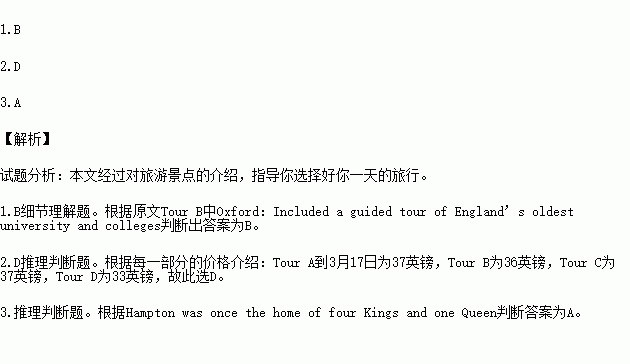题目内容
Choose Your One-Day Tours!
Tour A—Bath & Stonehenge including entrance fees to the ancient Roman bathrooms and Stonehenge—£37 until 26 March and £39 thereafter.
Visit the city with over 2,000 years of history and Bath Abbey,the Royal Crescent and the Costume Museum. Stonehenge is one of the world’s most famous prehistoric monuments dating back over 5,000 years.
Tour B—Oxford & Stratford including entrance fees to the University St Mary’s Church Tower and Anne Hathaway’s house— £32 until 12 March and £36 thereafter.
Oxford : Includes a guided tour of England's oldest university city and colleges.Look over the"city of dreaming spires(尖顶)"from St Mary's Church Tower. Stratford: Includes a guided, tour exploring much of the Shakespeare wonder.
Tour C—Windsor Castle & Hampton Court including entrance fees to Hampton Court Palace—£34 until 11 March and £37 thereafter.
Includes a guided tour of Windsor and Hampton Court, Henry VIII's favourite palace. Free time to visit Windsor Castle (entrance fees not included) .With 500 years of history, Hampton Court was once the home of four Kings and one Queen. Now this former royal palace is open to the public as a major tourist attraction. Visit the palace and its various historic gardens,which include the famous maze (迷宫) where it is easy to get lost!
Tour D—Cambridge including entrance fees to the Tower of Saint Mary the Great—£33 until 18 March and £37 thereafter.
Includes a guided tour of Cambridge, the famous university town, and the gardens of the 18th century.
1.Which tour will you choose if you want to see England's oldest university city?
A.Tour A. B.Tour B.
C.Tour C. D.Tour D.
2.Which of the following tours charges the lowest fee on 17 March?
A.Windsor Castle & Hampton Court
B.Oxford & Stratford
C.Bath & Stonehenge
D.Cambridge
3.Why is Hampton Court a major tourist attraction?
A.It used to be the home of royal families
B.It used to be a well-known maze
C.It is the oldest palace in Britain
D.It is a world-famous castle
 字词句篇与同步作文达标系列答案
字词句篇与同步作文达标系列答案任务型阅读
请认真阅读下列短文,并根据所读内容在文章后表格中的空格里填入一个最恰当的单词。
注意:每个空格只填1个单词。请将答案写在答题卡上相应题号的横线上。
Deep reading, as opposed to superficial (shallow) reading we do on the Web, is an endangered practice, one we ought to take steps to preserve as we would a historic building or a significant work of art.
Recent research has illustrated that deep reading, characterized as a unique experience different kind from the mere understanding of words, is slow, immersive (沉浸的), rich in sensory detail and emotional and moral complexity. Although deep reading does not, strictly speaking, require a conventional book, the limits of the printed page are uniquely helpful to the deep reading experience. A book’s lack of hyperlinks (超链接), for example, frees the reader from making decisions—should I click on this link or not—allowing her to remain fully absorbed in the story.
That immersion is supported by the way the brain handles language rich in detail, indirect reference and figures of speech: by creating a mental representation that draws on the same brain regions that would be active if the scene were unfolding in real life. The emotional situations and moral dilemmas that are the material of literature are also vigorous (有活力的) exercise for the brain, driving us inside the heads of fictional characters and even, studies suggest, increasing our real-life capacity (能力) for recognition.
None of this is likely to happen when we’re browsing through a website. Although we call the activity by the same name, the deep reading of books and the information-driven reading we do on the Web are very different, both in the experience they produce and in the capacity they develop. A growing body of evidence suggests that online reading may be less satisfying, even for the “digital natives” to whom it is so familiar. Researchers reported that 39% of children and teens read daily using electronic devices, but only 28% read printed materials every day. Those who only read onscreen were three times less likely to say they enjoy reading very much and tell which book they like best. The study also found that young people who read daily only onscreen were nearly twice less likely to be above-average readers than those who read daily in print or both in print and onscreen.
All in all, the disappearance of deep reading would harm the intellectual and emotional development of generations growing up online, as well as the preservation of a critical part of our culture: the novels, poems and other kinds of literature that can be appreciated only by readers whose brains have been trained to understand them.
Passage outline | Supporting details |
The present situation about deep reading | ◆ As we are reading more on the Web, deep reading has a tendency to 1. . ◆ Like a historic building or a significant work of art, deep reading 2. our preservation. |
3. of deep reading | ◆ Deep reading4. complex emotional and moral experiences. ◆ Deep reading usually 5. from printed materials. ◆ Deep reading helps train a reader’s brain and make it more6. . ◆ Compared with online reading, deep reading can bring readers more 7. . ◆ Deep reading makes a bigger 8. in increasing readers’ reading ability. |
Conclusion | ◆ Without deep reading, generations in this digital world can’t develop well in emotion and9. . ◆ Without deep reading, people may be10. to appreciate literature. |

